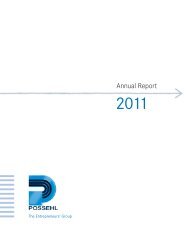Group - L. Possehl & Co. mbH
Group - L. Possehl & Co. mbH
Group - L. Possehl & Co. mbH
You also want an ePaper? Increase the reach of your titles
YUMPU automatically turns print PDFs into web optimized ePapers that Google loves.
The regular reporting is supplemented by credit scoring procedures<br />
and an active receivables management. Purchase and sales transactions<br />
over certain individual divisional limits must also be approved<br />
by the Executive Board of the holding company.<br />
Investment controlling covers the annual budget as well as follow-<br />
up inspections of the actual investment amounts. All capital expenditures<br />
are valued using return calculations based on a uniform<br />
methodology and minimum risk-adjusted rates of return, which are reviewed<br />
regularly. In divisions with longer production times, the central<br />
risk management group also focuses on new orders and order backing<br />
and on advance calculation checks above certain thresholds.<br />
The transfer of risks to insurers is managed – to the extent feasible<br />
and economically responsible – by our insurance broker, Lubeca<br />
Versicherungskontor G<strong>mbH</strong>, in coordination with the Executive Board<br />
of the holding company and involves insurance contracts for the<br />
whole <strong>Group</strong>.<br />
As an international corporation with a diverse portfolio, the <strong>Possehl</strong><br />
<strong>Group</strong> is subject as a rule to multiple risks, the most important of which<br />
are described below. Fundamental changes in the structure and assessment<br />
of risks have not occurred in comparison to the previous year.<br />
financial risks<br />
One of L. <strong>Possehl</strong>’s main responsibilities as holding company is to<br />
ensure the <strong>Group</strong>’s financial independence. As well as optimizing <strong>Group</strong><br />
financing, this means limiting the financial risks.<br />
To ensure liquidity at all times, sufficient cash and cash reserves<br />
are maintained to meet all of the <strong>Group</strong>’s payment obligations when<br />
they are due. A reserve is always maintained for unplanned cash stream<br />
irregularities. In addition, there are adequate bank credit lines.<br />
Liquidity is mainly sourced in Euro and US dollars with varying<br />
terms. Interest rate risks are analyzed regularly and any existing risks<br />
limited by appropriate hedging transactions.<br />
Letter from the Executive Board<br />
<strong>Co</strong>mpany Boards<br />
Report of the <strong>Co</strong>ntrolling Boards<br />
Successful over the Long Term<br />
<strong>Group</strong> Management Report<br />
<strong>Co</strong>nsolidated Financial Statements<br />
Further Information<br />
Liquid funds are invested exclusively in low-risk and short-term<br />
deposits and similar secure investment products.<br />
Currency risks<br />
Due to the global nature of the <strong>Group</strong>’s business activities, both<br />
business operations and financial transactions are subject to risks<br />
from currency exchange rate fluctuations, particularly of the US dollar<br />
against the Euro. A currency risk exists when sales are generated in<br />
a different currency than associated costs. This applies particularly to<br />
the Electronics division.<br />
To limit the risks of multiple cash flows in different currencies,<br />
foreign currency positions are normally hedged when they arise. This<br />
involves the use of conditional and unconditional derivative financial<br />
instruments. Transaction risks from the conversion of the net assets<br />
of <strong>Group</strong> subsidiaries outside the Eurozone are fundamentally not<br />
hedged.<br />
risks from Purchase and Sale of <strong>Co</strong>mpanies<br />
The acquisition of companies and – in exceptional cases – also the<br />
sale of subsidiaries or equity investments are important parts of our<br />
corporate strategy. With company acquisitions, the fundamental risk<br />
exists that the future earnings power of the company was improperly<br />
assessed and therefore the purchase price was too high.<br />
In any case, the Executive Board of the holding company decides<br />
on company purchases and sales. In order to limit the risk associated<br />
with company purchases, prior to the investment decision as a rule<br />
comprehensive legal, tax, and financial analyses are prepared with the<br />
assistance of external advisors. We have extremely strict internal rules<br />
for valuing individual potential acquisition targets.<br />
27




